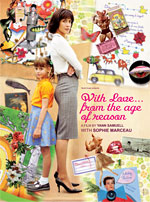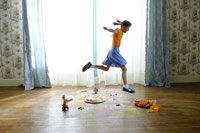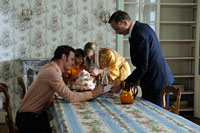|
en français
|
time schedule
| feature films
|
short films
| program [PDF]
2011 Festival Feature Films (March 24-27)

French actress Juliette Chappey presents LÂge de raison
director Yann Samuell screenplay Yann Samuell
starring Sophie Marceau, Juliette Chappey, Marton Csokas, Michel Duchaussoy, Jonathan Zaccaï, Thierry Hancisse, Déborah Marique, Emmanuelle Grönvold, Roméo Lebeaut, Alexis Michalik, Emmanuel Lemire running time 1 h 37 min general audience
Synopsis
“Dear Me,
Today I’m 7 years old and I am writing you this letter to help you remember the promises that I've made during the Age of Reason and to also remind you that I want to become ...”
So begins the letter that Margaret, an accomplished businesswoman, receives on her 40th birthday.
director/screenwriter
Yann Samuell
| 2009 |
L’Âge de raison |
| 2005 |
My Sassy Girl |
| 2003 |
Jeux d’enfants |
actress
Sophie Marceau
| 2009 |
L’Âge de raison by Yann Samuell |
| 2008 |
L’Homme de chevet by Alain Monne |
|
LOL by Lisa Azuelos |
|
De l’autre côté du lit by Pascale Pouzadoux |
| 2007 |
Les Femmes de l’ombre by Jean-Paul Salomé |
|
Ne te retourne pas by Marina De Van |
| 2006 |
La Disparue de Deauville |
| 2004 |
Anthony Zimmer by Jérôme Salle |
| 2003 |
Je reste! by Diane Kurys |
|
A ce soir by Laure Duthilleul |
| 2001 |
Belphégor, le fantôme du Louvre by Jean-Paul Salomé |
|
Parlez-moi d’amour |
| 2000 |
La Fidélité by Andrzej Zulawski |
| 1996 |
Marquise by Véra Belmont |
| 1995 |
L’Aube à l’envers |
|
Par-delà les nuages by Michelangelo Antonioni |
| 1994 |
La Fille de D’Artagnan by Bertrand Tavernier |
| 1992 |
Fanfan by Alexandre Jardin |
| 1991 |
La Note bleue by Andrzej Zulawski |
|
Pour Sacha by Alexandre Arcady |
| 1990 |
Pacific Palisades by Bernard Schmitt |
| 1989 |
Mes nuits sont plus belles que vos jours by Andrzej Zulawski |
| 1988 |
Chouans by Philippe de Broca |
|
L’Etudiante by Claude Pinoteau |
| 1986 |
Descente aux enfers by Francis Girod |
| 1985 |
Police by Maurice Pialat |
|
L’Amour braque by Andrzej Zulawski |
| 1984 |
Fort Saganne by Alain Corneau |
|
Joyeuses Pâques by Georges Lautner |
| 1982 |
La Boum 2 by Claude Pinoteau |
| 1981 |
La Boum by Claude Pinoteau |
actors
Marton Csokas
| 2010 |
L’Arbre by Julie Bertucelli |
| 2009 |
L’Âge de raison by Yann Samuell |
|
Michel Duchaussoy
| 2010 |
Elle s’appelait Sarah by Gilles Paquet-Brenner |
| 2009 |
Mères et filles by Julie Lopes-Curval |
|
Tricheuse by Jean-François Davy |
|
Persécution by Patrice Chéreau |
|
La Loi de Murphy by Christophe Campos |
|
L’Autre Dumas by Safy Nebbou |
|
Imogène McCarthery by Alexandre Charlot, Franck Magnier |
|
Coup de jeune by Samuel Tudela |
|
L’Âge de raison by Yann Samuell |
| 2008 |
Mesrine: L’instinct de mort by Jean-Francois Richet |
|
Arthur 3, la guerre des deux mondes by Luc Besson |
|
Arthur et la vengeance de Maltazard by Luc Besson |
|
Le Petit Nicolas by Laurent Tirard |
|
Mesrine: L’ennemi public n◦1 by Jean-Francois Richet |
|
Le Lit près de la fenệtre by Michaёl Barocas |
| 2007 |
Les Deux Mondes by Daniel Cohen |
| 2006 |
Lune de miel by François Breniaux |
| 2005 |
Le plus beau jour de ma vie by Julie Lipinski |
|
La Boîte noire by Richard Berry |
|
Arthur et les Minimoys by Luc Besson |
|
Le Voyageur de la Toussaint by Philippe Laik |
| 2004 |
La Demoiselle d’honneur by Claude Chabrol |
| 2003 |
Dédales by René Manzor |
|
Confidences trop intimes by Patrice Leconte |
|
Le Cadeau d’Elena by Fréderic Graziani |
| 2002 |
Bienvenue chez les Rozes by Francis Palluau |
|
Tristan by Phillipe Harel |
|
La Voix de mon fils by Alexandre Brasseur |
| 2001 |
Amen by Costa-Gavras |
|
La Mentale by Manuel Boursinac |
| 2000 |
La Veuve de Saint-Pierre by Patrice Leconte |
|
T’aime by Patrick Sébastien |
|
Les Portes de la gloire by Christian Merret-Palmair |
|
Lise et André by Denis Dercourt |
| 1998 |
Disparus by Gilles Bourdos |
|
Fait d’hiver by Stéphanie Cotta |
| 1993 |
Pas d’amour sans amour by Evelyn Dress |
|
Cache cash by Claude Pinoteau |
| 1992 |
Le Diable à quatre by Giorgio Ferrara |
| 1991 |
Les Cahiers bleus by Serge Leroy |
| 1990 |
Milou en mai by Louis Malle |
|
Voir l’éléphant by Jean Marboeuf |
|
Equipe de nuit by Claude d’Anna |
| 1988 |
Bernadette by Jean Delannoy |
| 1986 |
Le Môme by Alain Corneau |
| 1984 |
Partenaires by Claude d’Anna |
| 1979 |
Je te tiens, tu me tiens par la… by Jean Yanne |
|
La Ville des silences by Jean Marboeuf |
| 1977 |
L’Homme pressé by Edouard Molinaro |
|
Armageudon by Alain Jessua |
| 1974 |
La Jeune Fille assassinée by Roger Vadim |
| 1973 |
Traitement de choc by Alain Jessua |
|
Nada by Claude Chabrol |
| 1971 |
Aussi loin que l’amour by Fréderic Rossif |
|
L’Homme au cerveau greffé by Jacques Doniol-Valcroze |
|
L’Accalmie by Alain Magrou |
| 1970 |
La Rupture by Claude Chabrol |
|
Ils by Jean-Daniel Simon |
| 1969 |
La Femme infidèle by Claude Chabrol |
|
Bye, bye, Barbara by Michel Deville |
|
La Main by Henri Glaeser |
|
Que la bête meurt by Claude Chabrol |
| 1967 |
La Louve solitaire by Edouard Logereau |
| 1966 |
Jeu de massacre by Alain Jessua |
|
|
|
|
Juliette Chappey
| 2010 |
L’élève Ducobu by Philippe de Chauveron |
| 2009 |
L’Âge de raison by Yann Samuell |
Interview with Yann Samuell (director/screenwriter)
How was this third film born?
Above all, it is an idea I had for my own life. The day of my 18th birthday, I asked myself what I would want to receive as a gift, and I decided that it would be tremendous to hear about my life when I was a child and to remember the things that had been important to me. When I was 30 years old, I regretted not having done it at 18 years old and when I was 40, I said to myself that I would make a film because I had not succeeded at doing this in life.
Your film, Love Me If You Dare, starts with a children's game and now this film has letters addressed to one’s self from a young age.
 I am not convinced that the life of a child is as playful as that. On the contrary, I think that it’s a period when we are very complete and when we are truly involved in everything that we do. Because of that, I believe that a little girl who throws herself in Marguerite’s adventure would not take it at as a game, but rather as the most serious thing that could happen to her.
I am not convinced that the life of a child is as playful as that. On the contrary, I think that it’s a period when we are very complete and when we are truly involved in everything that we do. Because of that, I believe that a little girl who throws herself in Marguerite’s adventure would not take it at as a game, but rather as the most serious thing that could happen to her.
Your characters often have a strong relationship to childhood. Is this a matter that you hold especially close to heart?
We know today that the personality of an individual is forged before the age of 3. To connect with your childhood is to discover your origins. It is rediscovering your starting point and your initial trajectory before the obstacles of life have deterred you. There exists a truth that compromises with age, sometimes for the better, sometimes for the worse. Like Malcolm says in the film: “To grow up is to move forward.” … You just have to be happy with the direction you are moving in. I am the happy father of five children, all of whom help me to stay close to the world of childhood.
How was the writing experience? Is this a joyous or painful time for you?
It is a phase that I love. I often compare the making of a film to the preparation of a good meal for friends. We start out by dreaming up recipes that we want to try out, then we go shopping and then bring it into the kitchen. For me, writing is the time when we dream up meals. It is the freest and the greatest part of the making of the film.
Marguerite is a character who is haughty, very charming and unpredictable. How did you create her?
It is not the scriptwriter who creates the character, but it is the character that creates the scriptwriter. It literally appears at the tip of the pen or on the computer screen and it guides me. At the beginning, I do not know where it is going, nor what it is going to become. Then, even when I invent situations and obstacles in the character’s path, the character always acts like him or herself.
How did you get the idea for the way that Marguerite identifies with great female figures to give herself courage?
Since Marguerite is a very determined woman, I especially did not want to give her a masculine image. In human history, there are truly marvelous women. This allowed me to pay tribute to them. On another hand, during moments of doubt, when I feel myself a little weak, I need strong identities like Marguerite does. There was a period of my life where I had a small cartoon character in my pocket that I turned to when I was in a weak situation: I could touch it and I could tell myself that in my place, this character would bounce back, because in cartoons, you always bounce back.
The secondary characters are delectable and hold many surprises. How did you imagine them?
I love the French cinema of the ’50s and ’60s that had strong roles for secondary characters. Consequently, when I make a film, I try to work in that style. Moreover, from the moment when I work with actors that I like, I owe it to them to trust them with complex roles worthy of their talent.
We rarely speak of the business world in comedies in France. What gave you the desire to evoke this field?
I searched for a counterpoint to Marguerite’s childhood. When we are little, and we look toward the future, we create something with our hands, contrary to big businesses where you juggle with concepts, numbers and virtual money. For me, these empty spaces, where there are only computers and telephones, represent the antithesis of what we imagine of the working world when we are children.
You play a lot on contrasts, like between ultramodern and the traditional village of Saou …
 During the preparation when I talked about the film with my team, I explained that it was a “vertical” film, since I had childhood meet the adult world; Europe encountering Africa; even the countryside versus a very big French city. In a few seconds, the universe totally changes, all while being in the same time and place. This brings back flagrant contrasts that exist in the current world, like, for example, in terms of the gap in wealth. Movies allow us to bring these contrasts to light in a vivid way, like a sort of urgent signal.
During the preparation when I talked about the film with my team, I explained that it was a “vertical” film, since I had childhood meet the adult world; Europe encountering Africa; even the countryside versus a very big French city. In a few seconds, the universe totally changes, all while being in the same time and place. This brings back flagrant contrasts that exist in the current world, like, for example, in terms of the gap in wealth. Movies allow us to bring these contrasts to light in a vivid way, like a sort of urgent signal.
How did you conceive the animation sequence?
I completely acknowledge being influenced by Tex Avery and Walt Disney. In Spy Game (2002), I favored a universe of cardboard cutouts, in My Sassy Girl (2005), my second film that I shot in the United States, I imagined a world with toys and for The Age of Reason (2009), I chose collages in the style of Prévert.
Why did you choose a cold frame, with geometric lines, for depicting the business world?
In contrast to my script, which is very dense, I had a pronounced taste for minimal décor so that the characters fill up the space. I also worked on the “verticality,” which I spoke of before, and on the contrast of colors between the business world and the countryside. It is an aesthetic orientation that appears very upstream, because I would have had a hard time writing a story that I could not visualize. If, during the time of writing the script, I had the feeling that I would not want to shoot a certain scene, it was because the story did not have a place in the script.
And the lighting?
I preferred the overexposure and somewhat overstated contrasts. Very early, I got the feeling that the business world has invested in contemporary art and that it was necessary to line up the walls with large, completely abstract paintings in cold and understated tonalities.
Did you write the film for Sophie Marceau?
It has been several years that we wanted to shoot a movie together. As soon as I wrote the first version of the script, which was still overly abundant and not very structured, I called Sophie to tell her that the role was for her. She was very touched, but I knew that it was necessary to re-work the script. When I got to the 13th version, I contacted her again and she then explained to me that she wanted a break after doing four films in a row. However, she agreed to read the script and she called me to tell me that she was totally captivated. I was very fortunate, since she was my first and only choice!
How was the casting of the rest of the actors?
Jonathan Zaccaï loved Jeux d’enfants (2002) and told me yes even before reading the script. Regarding Michel Duchaussoy, I thought he would be perfect for the role of Mérignac. There is also my son Romeo who plays Philibert as a child and also my wife who plays Mme de Lorca — this happened without having to put pressure on the casting director!
The young girl is tremendous, so fresh and natural. How did you find her and direct her?
Young Juliette had astonishing professionalism. Unlike many children who look to match the image that they have of an actor, she has a natural elegance.
How did you direct the actors?
In reality, I don’t really have the impression of “directing” the actors because they know their jobs better than any director ever could. Consequently, I am inspired by what they think about their roles and I listen to their suggestions, often taking them into account. I try only to lead them in my vision of the film, which leads to discussions between us. On the set, I usually sit below the camera to be closer to them, as if I were at the theater. I am almost never at the “monitor,” which implies an absolute confidence in my director of photography, Antoine Roch.
Whom did you choose for the music?
I wanted an unobtrusive kind of music. When the composer, Cyrille Aufort, watched the film, he told me that he had been really moved and that he wanted to create a “temperate” kind of music I think that he captured well the spirit of the film: His music is both romantic and lyrical but all in moderation.
Interview with Sophie Marceau (actress)
What interested and moved you about Yann Samuell?
He is a filmmaker who has his own real universe that I entered into with so much delight. And above all, it is a world linked to childhood: I believe that it is important to never forget the child that you were, nor where you come from.
What was your first reaction when you read the script?
It is a little peculiar because it is a film that does not have codes or well-known references. You get into it without knowing where you are going, like in Alice in Wonderland: You open a door and you don’t know what you’ll find behind it.
Given all the great women with which Marguerite identifies, which of them do you feel the closest to?
They are all women who had a particular talent, and whom I admire, like Mother Teresa, Marie Curie or Ava Gardner. I believe that I would have liked to be Maria Callas because singing invokes an immediate emotion. But, deep down, all women are wonderful beings. It requires tremendous courage to take on all that awaits us, between our lives as mothers, professionals and spouses.
|

